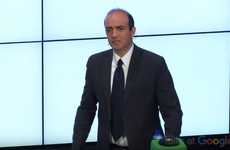
Need Inspiration?
Get inspired by 4,000+ keynote speaker videos & our founder, a top keynote speaker on innovation.
Nita Farahany's Talk on Cognitive Liberty Raises Justified Concerns
Kalin Ned — November 27, 2018 — Keynote Trends
References: law.duke.edu & ted
An ethicist and a scholar, Nita Farahany delivers a captivating talk on cognitive liberty. The speaker harnesses her experience as a professor of law and philosophy at Duke University to raise awareness of the evolving environment of technology and what that entails for our mental privacy.
Innovations in fields like neuroscience, artificial intelligence, and machine learning had the potential to seriously disrupt human lives. The introduction of smart home technology has already begun to change the landscape of the traditional home. Life-redefining tech might bring things like convenience and awareness to consumers — for example, smart devices help individuals track their health and detect life-threatening issues sooner. However, they also bring some gruesome uncertainties that need to be addressed.
Nita Farahany focuses on consumer-based EEG devices in her talk on cognitive liberty. She argues that such brain-monitoring gadgets threaten mental privacy. The accurate depiction of one's mental landscape has dangerous implications for skewing power dynamics and exploitation. News sources, for example, have provided information that in government-run factories in China, workers are required to wear an EEG device so employers can monitor productivity and emotional state. Moreover, a world of brain transparency would entail self-censorship. Farahany gives more examples of questionable ethical use of technology and her talk on cognitive liberty advocates for the protection of mental privacy and the freedom of thought as a fundamental human right.
Nita Farahany calls attention that current laws are not keeping up-to-speed with technological change and that is a problem. The speaker advocates for the implementation of guidelines that will provide with the ethical handling of information and the preservation of cognitive liberty.
Innovations in fields like neuroscience, artificial intelligence, and machine learning had the potential to seriously disrupt human lives. The introduction of smart home technology has already begun to change the landscape of the traditional home. Life-redefining tech might bring things like convenience and awareness to consumers — for example, smart devices help individuals track their health and detect life-threatening issues sooner. However, they also bring some gruesome uncertainties that need to be addressed.
Nita Farahany focuses on consumer-based EEG devices in her talk on cognitive liberty. She argues that such brain-monitoring gadgets threaten mental privacy. The accurate depiction of one's mental landscape has dangerous implications for skewing power dynamics and exploitation. News sources, for example, have provided information that in government-run factories in China, workers are required to wear an EEG device so employers can monitor productivity and emotional state. Moreover, a world of brain transparency would entail self-censorship. Farahany gives more examples of questionable ethical use of technology and her talk on cognitive liberty advocates for the protection of mental privacy and the freedom of thought as a fundamental human right.
Nita Farahany calls attention that current laws are not keeping up-to-speed with technological change and that is a problem. The speaker advocates for the implementation of guidelines that will provide with the ethical handling of information and the preservation of cognitive liberty.
5.9
Score
Popularity
Activity
Freshness
















